(IPYS/IFEX) – Three months after charges for “insult” (“desacato”) were filed by the Supreme Court against businessman and television panelist Eduardo Yáñez, the accused’s lawyers have not been granted access to the summons that initiated the case, nor details on the proceedings. In an exclusive interview with IPYS, Yáñez noted that he is currently facing […]
(IPYS/IFEX) – Three months after charges for “insult” (“desacato”) were filed by the Supreme Court against businessman and television panelist Eduardo Yáñez, the accused’s lawyers have not been granted access to the summons that initiated the case, nor details on the proceedings.
In an exclusive interview with IPYS, Yáñez noted that he is currently facing charges and is considered a “prisoner”. “I am out on bail because I paid 100,000 pesos [approx. US$150]. I am also facing a restriction order. Before I could leave the country [in March, to attend a hearing before the Inter-American Commission on Human Rights, IACHR] I had to pay a bond of 200,000 pesos [approx. US$300],” the businessman stated.
Yáñez remarked that his defense lawyers have not been given access to the summons that initiated the case. “My lawyers tell me, ‘Eduardo, we do not know what you are being accused of precisely’,” he noted.
While speaking on a television programme, Yáñez referred to the justice system as “immoral, cowardly and corrupt”. He further noted that it had shown a “lack of manhood” by not apologising to a young woman who spent three years in jail unjustly accused of a crime that she was later exonerated of.
Yáñez’s lawyers have requested information on the summons and summary proceedings on two occasions. Nevertheless, the judge presiding over the case, José Muñoz Pardo, denied the request and provided no justification for his decision. All the defense knows is that the other panelists who were present on the day Yáñez commented on the justice system have given statements to the court. In addition, the court has already requisitioned the video recording of the television programme.
Yáñez feels like he is “in a real fix.” As he is considered a “prisoner who has been released on bail” and is facing a restriction order, any small slip could cost him his freedom.
“This is an intimidating measure. It is very damaging to myself, to my family. I have not been able to travel freely as I have done for the last twenty years for my work,” Yáñez added.
Without intending to, Yáñez is now fighting for the repeal of “insult” laws in Chile. In his opinion, such measures inhibit public debate and “will keep us underdeveloped. This not only affects journalists or myself. It impacts on artistic creation, on science, as the margins of innovation widen.”


